“Experiencing connecting issues“- CAPACETE Athens 2017
….
Independent curator and researcher based in Athens, Greece. Between 2012- 2015 she held curatorial positions in public art institutions in London including at the Serpentine Galleries, The Architecture Foundation and the Contemporary Art Society. In 2016-2017 Tsipni-Kolaza worked as a Curatorial Assistant for documenta 14 in Athens and Kassel. Her recent projects include: Orange Trees that Talk, a mediated performance by Cooking Sections at the Botkyrka Konsthall in Stockholm and “Sonic Revolutions Vibrations from the Levant” presented at Haus der Kulturen der Welt Berlin, 2016. Having received the Forecast Platform award Tsipni-Kolaza developed Sonic Revolutions as a two day exhibition in the form of an album, exploring issues of spatial justice, collective memory and history through the detour of popular culture. For her four months residency with Capacete in Rio, she will be continuing her research in underground and popular culture and its various forms of artistic expressions with a focus on music, sound, performance and film. She aims to look at the history of art collectives, artist-run spaces,curatorial initiatives and institutional frameworks to investigate the formats they employ in order to survive the rapid changes they occur in the city’s economic and political landscape

Bruna Kury is a Brazilian anarcotransfeminist, performer, researcher of kuir sudaka in daily life and has performed with the Coletiva Vômito, Coletivo Coiote, La Plataformance, MEXA and Coletivo T. Pirateia and does post porn and pornoterror. She develops direct performances / actions against the prevailing compulsory heteronormative patriarchal cis-theme and structural oppressions (class WAR), especially in crisis places. He has recently participated in the All Genders show with PornôPirata, the cultural turn in SP with the T Collective and the 10mg Terminal with the MEXA Collective.
She intends in the residence to research and to experience and to change on the created concept “pornorecycling” and the purge of the patriarchy in the “vomit workshop”.
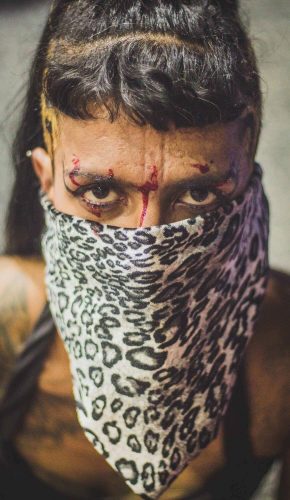
foto por Rafael Marques
Brasil/Holanda
What is “the role of the fine art artist” in art and society? The aim of this project (residency) is to survey the role of the fine artist and the development of the artistic scene in Brazil from the1960s to contemporary time, in connection with socio cultural developments. This survey is not meant to study just historical facts but to analyze, through source study and discussion panels, the role of the fine art artist throughout the militarism in the 60s, passing through the democratic changes in the middle 80s, the impeachment in 1993 and the election of the first left wing president in Brazil. Therefore, this residency is to function as a platform allowing past to meet present, as well as to analyze the similarities and differences between artists from consecutive periods in the past and artists of the present day.
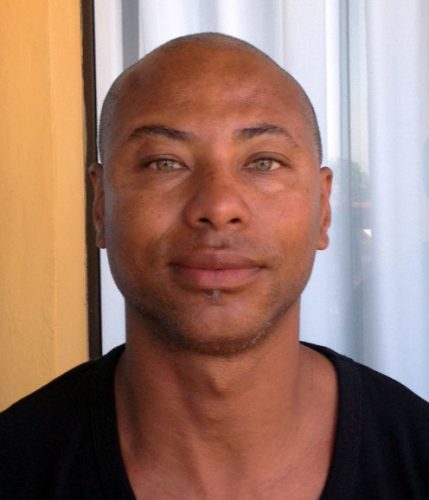
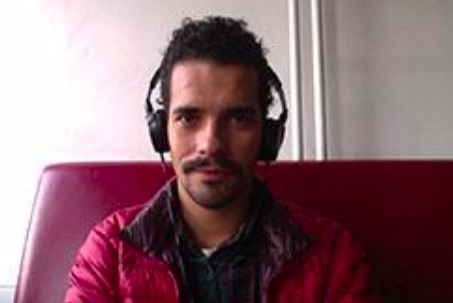
Name: RODRIGO ANDREOLLI
Nacionality: Brasil
Born: 1984
RODRIGO ANDREOLLI transits through the performing arts, especially interested in researching the body as an element for sensitive activation of the visible and invisible layers of the public matter. He acts elaborating production structures in multidisciplinary art projects.
RODRIGO ANDREOLLI (São Paulo/Brazil) is a São Paulo based dancer, actor and producer. He works with Brazilian Theater Company TEAT(R)O OFICINA, directed by José Celso Martinez Corrêa, since 2006. Rodrigo has collaborated with Brazilian choreographer Cristian Duarte on the piece THE HOT ONE HUNDRED CHOREOGRAPHERS in 2011 and has taken part in experiments on the research frame APT? – A PIECE…TOGETHER? led by Cristian Duarte and Paz Rojo, in 2010 and 2011, in festivals in São Paulo and Madrid. Rodrigo has created the solo piece CUTOUT (2012 – RESIDÊNCIA FUNARTE OUTRAS DANÇAS); the duet A/R, in collaboration with Brazilian artist Raissa Ralola (2013/2014 – Prêmio Funarte Klauss Vianna); the performance ATTEMPT AT EXHAUSTING [A POINT OF VIEW] (2013 – Centro Cultural São Paulo; the publication ÍNCIDE PARA ESCUTA, with Clarissa Sacchelli (2014- Centro Cultural São Paulo), TRAGÉDIA: UMA TRAGÉDIA, directed by Carolina Mendonça, as assistant director and actor (2014- SESC/SP); He was a resident artist and producer of the Residency Project LOTE#1, LOTE#2 and LOTE#3, coordinate by Cristian Duarte in São Paulo.
He was in the dance pirece TIRA MEU FÔLEGO (Take my breath away), by Elisa Ohtake (2014); BATUCADA, by Marcelo Evelin/Demolition INC (2014) and athe theater piece THE LADY OF THE SEA, by Bob Wilson (2014).
He also developed the research project TERREYRO COREOGRÁFICO, with Daniel Kairoz, framing actions on public spaces to study the crossings of choreography, architecture and digital programming.
He studied at SNDO – SCHOOL OF NEW DANCE DEVELOPMENT- Intensive Course (Amsterdam, 2009) and he was selected for DANCEWEB SCHOLARSHIP PROGRAM 2015 – IMPULSTANZ VIENNA INTERNATIONAL DANCE FESTIVAL.
RODRIGO ANDREOLLI
RODRIGO ANDREOLLI (São Paulo/Brasil), ator, dançarino e produtor. Desde 2006, integra projetos do TEAT(R)O OFICINA UZYNA UZONA, sob direção de José Celso Martinéz Corrêa. Foi parte do elenco para montagem do espetáculo PARAÍSO SEM CONSOLAÇÃO, sob direção de Constanza Macras (2008). Participou dos experimentos realizados pelo campo de trabalho APT? – A PIECE…TOGETHER? – coordenado por Cristian Duarte e Paz Rojo nos anos de 2010 e 2011, em São Paulo, Madrid e Viena. Foi colaborador de Cristian Duarte para a criação HOT 100 – THE HOT ONE HUNDRED CHOREOGRAPHERS. Em 2012 foi artista residente do Projeto OUTRAS DANÇAS FUNARTE – Porto Alegre- RS, onde iniciou a pesquisa de trabalho solo CUTOUT. No mesmo contexto iniciou uma parceria com Raissa Ralola (MG) para a criação de A/R, contemplado pelo Prêmio Klauss Vianna 2013. Criou para Centro Cultural SP, o trabalho TENTATIVA DE ESGOTAMENTO [DE UM PONTO DE VISTA] (2013) e a publicação ÍNDICE DE ESCUTA (2014) em colaboração com Clarissa Sacchelli. Foi artista-residente e produtor do projeto LOTE#1, LOTE#2 e LOTE#3 (2011-2014). Foi assistente de direção e ator da montagem TRAGÉDIA: UMA TRAGÉDIA, de Will Eno, direção de Carolina Mendonça. Integrou elenco de TIRA MEU FÔLEGO, de Elisa Ohtake (2014), participou de BATUCADA, de Marcelo Evelin/Demolition INC (2014) e A DAMA DO MAR, de Bob Wilson (2014).
Em 2014/15, integrou o projeto TERREYRO COREOGRÁFICO, proposto por Daniel Kairoz, subsidiado pelo programa de Fomento à Dança para a Cidade de São Paulo.
Cursou o Intesive Course SNDO – SCHOOL OF NEW DANCE DEVELOPMENT (Amsterdam, 2009) e foi artista selecionado para o programa DANCEWEB 2015 no IMPULSTANZ VIENNA INTERNATIONAL DANCE FESTIVAL.
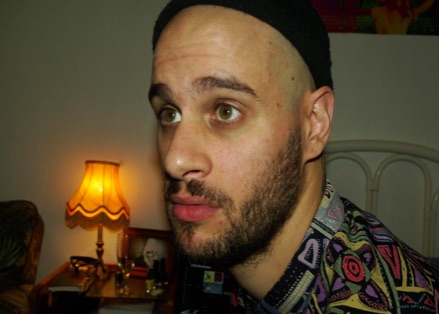
Name: Jari Malta
Nationality: Uruguay
Born: 23/10/1985
Jari Malta (Montevideo, Uruguay) researches about issues like gender, sexuality, race, migration, subcultures, belonging and critical animal studies. His investigations have brought him into different fields, from fictional writing and theory to curatorship or theater.
He holds a BA in Philosophy, a BA in Comparative literature and a MA in Creative Writing. He also took part of the Independent Studies Programme at the Museum of Contemporary Art of Barcelona (MACBA) and conformed the research group Critical Genealogies of Sexual Disobedience from the South (National University of La Plata).
He worked in different cultural institutions like the Center of Contemporary Culture of Barcelona (Spain), MACBA, Fundació Miró (Spain) or Smålands Nation (Sweden). As a result of his collaboration with Marta Echaves he co-curated the exhibition Casa Matriz (Espai Colona and Angels Gallery, Spain) and participated in the publication of Anales Coloniales.
Jari Malta (Montevideo, Uruguay) studied Philosophy and Comparative Literature. He took part of the Independent Studies Programme at MACBA and conformed the research group Critical Genealogies of Sexual Disobedience from the South (National University of La Plata, Argentina) . Combining creative and theoretical writing, his work mainly deals with questions like gender, race and its subcultural expressions.
Jari Malta (Montevideo, Uruguay) es licenciado en filosofía y literatura comparada. Participó en el Programa de Estudios Independientes del MACBA y formó parte del proyecto de investigación Genealogías Críticas de las Desobediencias Sexuales desde el Sur (Universidad Nacional de La Plata, Argentina). Combina la escritura literaria con la teoría, prestando especial atención al género, la raza y sus manifestaciones subculturales.
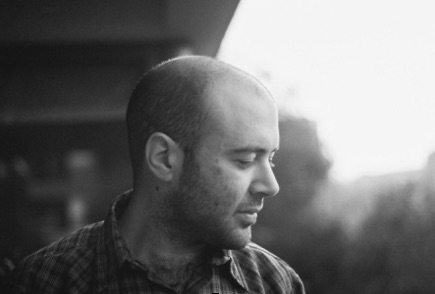
Name: Raúl Hott
Nationality: Chilean
Born: 1984
Website: http://raulhott.net/
Raúl Hott is an architect, artist and educator that does work about the body. He designs collective experiences for public spaces and natural environments. His projects are communal initiatives and actions that invigorate democratic access to the arts and public life, injecting horizontal participation and vitality. He is an artist whose work spans ephemeral architecture, sound, choreography, writing, graphic design, and numerous other fields. Raúl holds an MFA in New Forms from Pratt Institute.
Longer version:
Raúl Hott is an architect, artist, and educator that does work about the body, designing collective experiences for public spaces and natural environments. His projects are communal initiatives that invigorate democratic access to the arts and public life, injecting horizontal participation and vitality. He is an artist whose work spans architecture, sound, healing, choreography, writing, graphic design, and numerous other fields.
Raúl holds an MFA in New Forms from Pratt Institute. He has been particularly drawn by pedagogy, teaching in different Art and Architecture Schools since 2007. He is currently based in Athens, Greece, where he participates as a fellow resident of Capacete, a Brazilian experimental education program featured in Documenta 14. To participate in this Residency Program, Raúl was awarded with the Motel Capacete Fellowship from Chile.
Raúl Hott’s work has been featured at the Point Centre for Contemporary Art (Cyprus), Art in Odd Places Festival (NY), Trestle Gallery (NY), Ed. Varie Gallery (NY), Blackburn 20/20 Gallery (NY), Mykonos Biennale (Greece), Espacios Revelados (Chile), NAVE (Chile), and HALLE14 (Germany), among many others
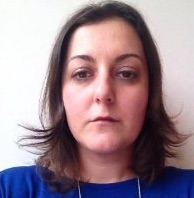
Name: Vasiliki Sifostratoudaki
Nationality: Greek
Born: Athens
Vasiliki Sifostratoudaki (Athens, GR, 1979) earned a bachelor in Fine Art and Education from Athens Schools of Fine Art (2012) and received a Master of Fine Arts from the Piet Zwart Institute, Rotterdam (2015), she participates in CAPACETE Athens (2017), founder of Yellow Brick project (2016). Recent exhibitions include: TAF Foundation “The place in the End” (2017), Art Fair Rotterdam (2017), “Rocks in Stock”(Solo show) at Joey Ramone, NL (2016), “Reframe Memory” at Benaki Museum, Athens, GR (2015); “An island folded as a dry bread” at Upominki, Rotterdam, NL (2015); “Performative Labour-ISM”, Month of performance at ZK/U Centre for Art and Urbanistics, Berlin, DE (2014); “Pantone Green and a Glass of Lemonade” in collaboration with Jessica Dunleavy supported by Snehta Residency and funded by British Council EUNIC, at Bhive, Athens, GR (2014). She lives and works in Rotterdam (NL) and Athens (GR.)
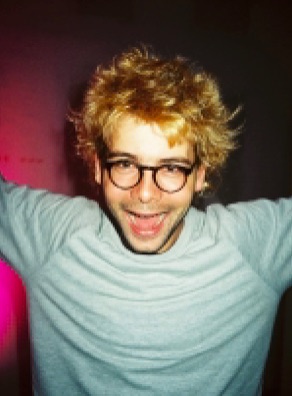
Name: Gian Spina
Nationality: Brazilian
Born: 1984
More information: http://gianspina.com
Gian Spina was born in São Paulo (Brazil) and lived, studied and worked besides others in San Diego (USA), Vancouver (Canada), Bordeaux (France), Berlin and Frankfurt (Germany).
From 2003 to 2005 at the Vancouver Film School, from 2005 to 2006 film-theory with Prof. Carlos Augusto Calil at the University of São Paulo and from 2007 to 2008 architecture at the Escola da Cidade.
In 2010 he moved to Germany, where he studied at the Vilem Flusser Archive at the Berlin University of the Arts, later on with Prof. Burghart Schmidt and Prof. Juliane Rebentisch at the Academy of Art and Design in Offenbach am Main (Germany) he received a scholarship from the Rotary-Club Offenbach am Main in 2011.
He has finished his master thesis oriented by the Philosopher Prof. Fabien Vallos at the École des Beaux Arts de Bordeaux.
In 2015 he started working as a professor at the art department at the Escola da Cidade where he taught for one year. He works part-time with the platform lanchonete.org.
Today he writes, periodically to the to the World Policy Institute and Arts Everywhere. As well as a guest professor at the Art Academy of Palestine, in 2017 take part at art residence program organized by the Dokumenta 14.
Has crossed the Balkans and the Central Asia with a bike, the West Bank, the Himalayas walking and speaks fluently 5 languages.
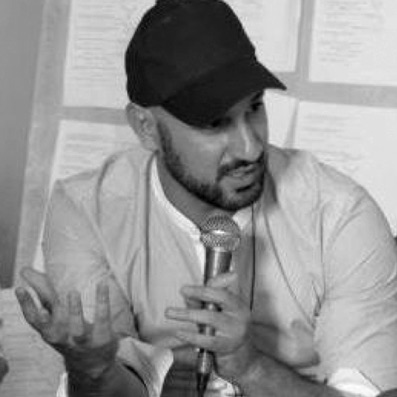
Name: Nikos Doulos
Nationality: Greek
Born: 1978
Nikos Doulos is an Amsterdam based artist, born and raised in Athens, Greece. He obtained a bachelor degree (BFA) in painting from the Athens School of Fine Arts (ASFA) and a Masters (MFA) in public space art from the Dutch Art Institute (DAI) in the Netherlands.
Doulos’ interest lies on inclusive modes of knowledge production achieved through discursive practices and temporal interventions. In his work, he creates malleable situations/conditions as participatory infrastructures and ‘soft’ knowledge generators. Walking holds a predominant part in his practice.
He is the founder of NIGHTWALKERS – a collectively practiced nocturnal walking project investigating the contemporary identity of the flanêur. NIGHTWALKERS has been performed in the Netherlands, Serbia, Sweden, Italy, Hungary and South Korea to name a few.
Doulos predominantly engages on research trajectories under the umbrella of Expodium – an ‘urban do tank’ that utilizes artistic means to address urban challenges and the ever-changing nature of cities.
He has presented collaborative projects at the Trafó House of Contemporary Arts (Budapest), Bildmuseet (Umeå), participated at the Impakt Festival (Utrecht), the Athens Biennale: #4 AGORA and the 53rd October Salon and has lead workshops for UNIDEE – Cittadelartte Pistoletto Foundation and the University of the Arts, Uniarts Helsinki among others.
He is a co-curator of ‘Unmaking The Netherlands’ program initiated by Expodium and a co-editor of the Unmaking or How To Rethink Urban Narratives publication. He teaches periodically at the University of the Arts, Uniarts in Helsinki. He works collaboratively.
Nikos Doulos’ participation at Capacete-Athens is generously supported by Mondriaan Fonds.
http://nightwalkersexpodium.tumblr.com/
Longer version
Nikos Doulos is an Amsterdam based artist, born and raised in Athens, Greece. He obtained a bachelor degree (BFA) in painting from the Athens School of Fine Arts (ASFA) and a Masters (MFA) in public space art from the Dutch Art Institute (DAI) in the Netherlands.
Doulos’ interest lies on inclusive modes of knowledge production achieved through discursive practices and temporal interventions. In his work, he creates malleable situations/conditions as participatory infrastructures and ‘soft’ knowledge generators. Walking holds a predominant part in his practice.
He is the founder of NIGHTWALKERS – a collectively practiced nocturnal walking project investigating the contemporary identity of the flanêur. NIGHTWALKERS has been performed in the Netherlands, Serbia, Sweden, Italy, Hungary and South Korea to name a few.
Doulos predominately engages on research trajectories under the umbrella of Expodium – an ‘urban do tank’ that utilizes artistic means to address urban challenges and the ever-changing nature of cities.
He has presented collaborative projects at the Trafó House of Contemporary Arts (Budapest), Bildmuseet (Umeå), participated at the Impakt Festival (Utrecht), the Athens Biennale: #4 AGORA and the 53rd October Salon and has lead workshops for UNIDEE – Cittadelartte Pistoletto Foundation and the University of the Arts, Uniarts Helsinki among others.
He is a co-curator of ‘Unmaking The Netherlands’ program initiated by Expodium and a co-editor of the Unmaking or How To Rethink Urban Narratives publication. He teaches periodically at the University of the Arts, Uniarts in Helsinki. He works collaboratively.
Nikos Doulos participation at Capacete-Athens is generously supported by Mondriaan Fonds.
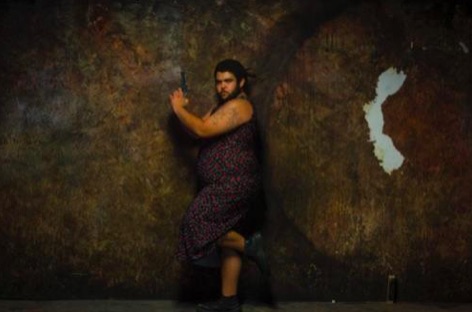
Name: Jota Mombaça
Nationality: Brazil
Born: 1991
Writer and performance artist
Is a non-binary bicha, born and raised in the northeast of Brazil, who writes, performs and academically studies on the relations between monstruosity and humanity, kuir studies, de-colonial turns, political intersectionality, anti-colonial justice, redistribution of violence, visionary fictions, the end of the world and tensions among ethics, aesthetics, art and politics in the knowledge productions of the global south-of-the-south. Current works are the collaboration with Oficina de Imaginação Política (São Paulo) and the artistic residency along with Capacete’s 2017 at Documenta (Athens/Kassel).
Alternative Bio
Jota Mombaça, 1991
Writer, performance artist and researcher
Is a non-binary bicha, born and raised in the northeast of Brazil, who owns a master degree in Social Sciences by UFRN (BR). At the bachelor degree, s/he had researched the topics of subaltern voice and knowledge, anal studies, negative anthropofagie, de-colonial thinking and cuir aesthetics in a dialogue with the artist Pêdra Costa; and hers master’s project was on the relations between monstruosity and humanity, specially in what concerns the topics of social inexistence, the end of the world as a political demand against normative violence and hers own experience as an impoverished non-binary fat racialized person of brazilian periphery. Besides, s/he is interested in kuir studies, de-colonial turns, political intersectionality, anti-colonial justice, redistribution of violence, visionary fictions and tensions among ethics, aesthetics, art and politics in the knowledge productions of the global south-of-the-south. Current works are the collaboration with Oficina de Imaginação Política (São Paulo) and the artistic residency along with Capacete’s 2017 at Documenta (Athens/Kassel
[gview file=”http://capacete.org/wp-content/uploads/2017/04/3.-Musa-Michelle-Mattiuzzi-Dissident-Black-Written-for-an-Error-Contained-Narrative.pdf”]
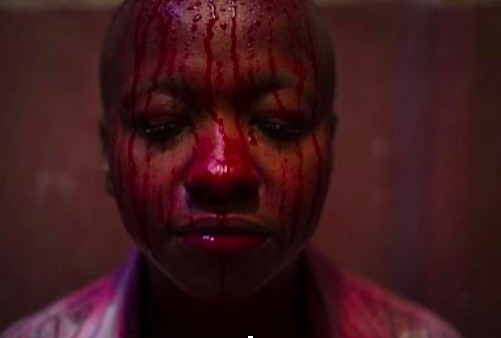
Name: Musa Michelle Mattiuzzi
Nationality: Brazil
Born: 19
Musa Michelle Mattiuzzi Ex-bank clerk , ex-receptionist, ex-employee in telemarketing, ex-assistant to xxx, ex-child carer, ex-dancer, ex-wife, ex-, ex-insurance broker, ex-student. She was expelled from the Universidade Federal da Bahia due to institutional racism. Black, author, performer, she moves interdisciplinarily across the arts.
Musa Michelle Mattiuzzi
http://musamattiuzzi.wix.com/musamattiuzzi
Skype: michelle.mattiuzzi
musamattiuzzi@gmail.com
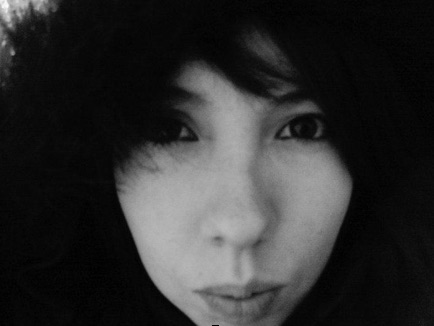
Name: Gris García
Nationality: Mexico
Born: 1986
Gris García (1986/Monterrey, Mexico).
She is an artist and an independent curator. Her work is centered around contemporary practices and those hybrid productions that emerge from dialogues and correspondences with the other. She studied Visual Arts at the UANL, Mexico. She has exhibited her work in México, Spain, Russia, Colombia and Canada. She has also studied the MA in Artistic Research and Production by the UB thanks to the study grant offered by FONCA CONACULTA. She has also been part of MACBA’s PEI (Independent Study Program) a Master’s program in Museistic studies and critical theory. She has curated projects such as Balmes 88 for a3bandas and Las condiciones posibles and amongst her most recent Casa entera. She was curator-in-residence at Lugar a dudas September-2014/ March-2015 and professor in curatorial and critical studies at ITM University in Medellin, Colombia. Currently is part of TuerCo. a multidisciplinary team who gives technological advisory for artistic projects.
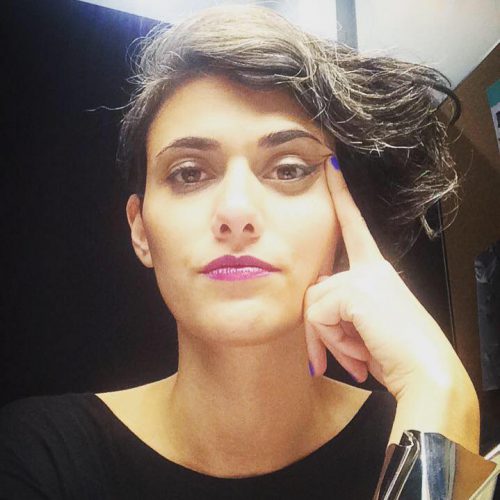
Name: Sol Prado
Nationality: Argentinia
Birthdate: 1985
They artwork and research is focus on create fictions (writing, performance, installations, workshops) through the use of ironic and parody procedures to dismantle, by intensification method, the perverse structure of the neoliberal paradigm.
It considers that the re-actualization of fascism´s mechanisms is expressed by means of a fine and cosmetic artillery of domestication whose final objective is the privatization of the common forces and thinking.
Sol Prado. Artist, independent researcher and performer.
Currently working in Capacete – Documenta 14 art and politics program, Athens – Kassel.
Studied at the Independent Program Studies in Barcelona Museum of Contemporary Art (MACBA), directed by Paul B. Preciado. Her works of art and collective research have focused on create fictions (writing, performance, installations, workshops) through the use of ironic and parody procedures to dismantle, by intensification method, the perverse structure of the neoliberal paradigm.
She considers that the re-actualization of fascism´s mechanisms is expressed by means of a fine and cosmetic artillery of domestication whose final objective is the privatization of the common forces and thinking.
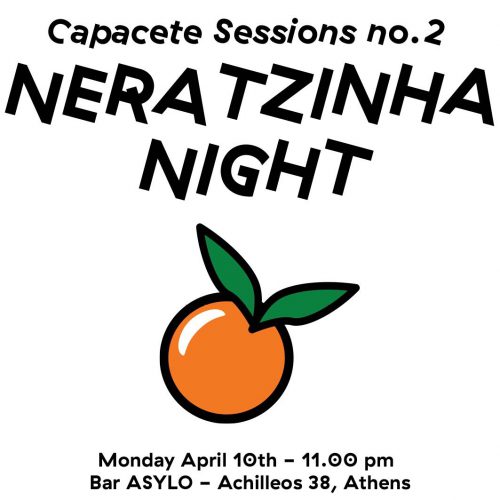
Monday April 10th -11.00pm
Bar ASYLO – Achilleos 38, Athens
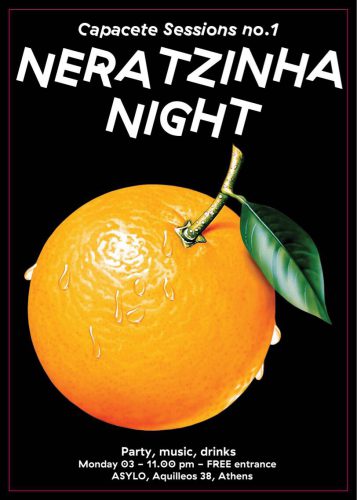
[gview file=”http://capacete.org/wp-content/uploads/2017/03/20.-Vasiliki-Sifostratoudaki-Susanna-Brown-There-is-Comfort-in-Recipes.pdf”]
Vasiliki Sifostratoudaki suggests a practice between the object and the social engagement work. Understanding line not as a linear perspective which provides a limit but a juxtaposition of singular points whose variety in form creates a possibility of movement between them, a moving sculpture. Initiator of the Yellow Brick research project.
[ess_grid alias=”Galeria de foto” layers='{“custom-image”:{“00″:”3190″,”01″:”3186",”02″:”3188″},”custom-type”:{“00″:”image”,";01″:”image”,”02″:”image”},”use-skin”:{“00":"-1″,”01″:”-1″,”02″:”-1″},”title”:{“01”:”Killing our Darlings, Rodrigo Andreolli (Brazil) and Vasiliki Sifostratoudaki (Greece)”,”02″:”READING – WRTING -MAKING”}}’][/ess_grid]
Gian Spina was born in São Paulo (Brazil) and lived, studied and worked besides others in San Diego (USA), Vancouver (Canada), Bordeaux (France), Berlin and Frankfurt (Germany).
Today he writes, periodically to the to the World Policy Institute and Arts Everywhere. As well as a guest professor at the Art Academy of Palestine, in 2017 take part at art residence program organized by the Dokumenta 14.
—
“Fabiana, Jarí, Raul, Gris, Jota, Rodrigo, Sol, Michelle, Nikos, Vasiliki, Helmut e Eliana mudaram a minha vida:
e deixei pra trás uma série de seres que fui.
+ -
jota me deu um novo e um soco de leve seguido de afago ou semente.
era para não ter ido por causa do amor
não sabia que o jarí existia, perto de omonia eu chorei com ele e vi que incomodava o mundo
fiz yoga, vomitei, caí de bicicleta e pensei
em desistência disfarçada de compromisso.
pra que isso ?
a fumaça que entrava dentro do quarto do segundo andar e eu na cama com a fabiana enquanto evitávamos falar de dor e amor.
as aproximadas trezentas e quarenta e sete músicas que ela sabia de cor e cantava dia sim dia não. instituição otta, lembrava a namorada da minha ex.
que força; esqueço todas as palavras quando penso no que foi ela,
o que me fez ela. não sabia que existia.
cinco dias por semana e depois mais dois foi gris e calma, agora gostaria de estar com ela rindo.
o fazer nada, a calma no corpo, esse marasmo infantil e quase anacrônico.
vontade de não largar nada disso nunca, parar aqui agora, segura esse espaço e deixa o sono de lado,
me corte para lembrar que vi e viví e voltei.
havia o heroi, que me fez amor, chorei de novo, talvez a última do ano,
tentei matar o homem em mim e não deu
vaso, vaso e vasilika abarca novamente e me abraça
o chão não é o mais mesmo, nem as varandas, hot, pedia mais amor e carne, para ir e voltar.
enquanto eu caía, sistematicamente por vinte minutos com o rodrigo eu caía, e pedia, logo após
um pouco mais.”
Eliana Otta is a multidisciplinary artist. Through drawing, writing, video, installations and participatory projects, she associates simple details from everyday life that can speak about complex processes in specific contexts, inquiring how subjectivities shape public space by relating the personal to the political, as well as individual and shared memories to questions about the present and our possible collective wishes for the future. Economic inequality, precarious labor, gender violence and our relation with nature in neoliberal extractivist systems, are some of her main focus of interest.
+ Un día le dije a Helmut que me parecía que lo que más teníamos en común los seleccionados para esta experiencia era la ternura. Afinando la idea, quizá es que cada uno está buscando cómo defender las vulnerabilidades y la intensidad de los afectos en los contextos tan violentos, agresivos e injustos en los que nos movemos, buscando otros lugares a donde pertenecer o cómo hacer que aquellos a los que pertenecemos nos permitan ser. Luego de este año, una nueva certeza es que ahora tengo más cómplices para continuar con ese intento.” -
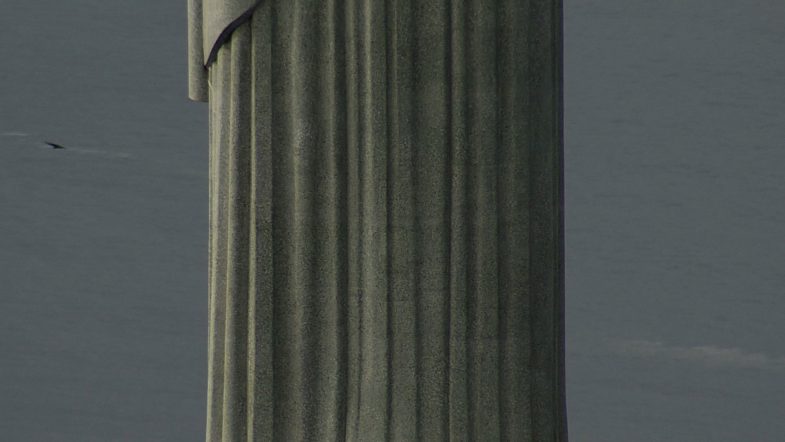
Por 19 anos o CAPACETE recebeu atores ativos em diferentes campos e provenientes de todo o mundo para experimentar, trocar, pesquisar, amar, produzir, apresentar, publicar e compartilhar. Agora é a vez do CAPACETE se deslocar: um grupo de 12 participantes foi selecionado para participar em um programa de 9 meses de duração em e com Atenas, num contexto estrangeiro às atividades originais e regulares do CAPACETE.
A abordagem do CAPACETE em relação à aprendizagem e à pesquisa baseia-se numa prática coletiva, discursiva, performática e experimental, que requer tempo e envolvimento estreito, de modo a formar um sistema de intercâmbio e produção descentralizado e menos hierárquico.
A comissão de seleção dos residentes para o programa foram: Xafos Xagoraris (Académia de Belas Artes/Athenas), Paul B. Preciado (documenta14/Athenas), Lígia Nobre (São Paulo), Amilcar Packer (São Paulo) e Helmut Batista (CAPACETE/Rio de Janeiro).
CAPACETE
“Escolas que se posicionam como lugares de “produção de conhecimento” privilegiados ou exclusivos apenas reafirmam as desigualdades sociais e as hierarquias existentes.”
Paulo Freire,
(Pedagogia da Autonomia – Saberes Necessários à Prática Educativa)
“Os quatro pontos cardeais são três:
Sul e Norte.”
Vicente Huidobro, Altazor
De março a dezembro de 2017, o Capacete vai desdobrar sua programação em Atenas (e parte em Kassel), no contexto da documenta 14 e em eventos relacionados, como a Bienal de Atenas e os programas e atividades culturais regulares da cidade.
Se, em um mundo integrado, tudo parece fundir-se homogeneamente, os processos hegemônicos:
• O que significa deslocar uma aprendizagem experimental, coletiva e uma iniciativa baseada na investigação de um continente para outro – especificamente a partir do hemisfério sul para o Sul do Norte? O que motiva tal deslocamento e o que isso implica?
• Como tal iniciativa engaja-se em um novo contexto local, tendo em conta a complexidade e heterogeneidade destas comunidades, de suas histórias e dinâmicas socioculturais?
Se, em alguma medida, a Grécia Antiga era e ainda é utilizada como matéria-prima para moldar a imaginação da modernidade ocidental, o que pode oferecer a Grécia contemporânea ao desmantelamento do colonialismo e do capitalismo neoliberal, especulativo e financeiro?
Por 19 anos o CAPACETE recebeu atores ativos em diferentes campos e provenientes de todo o mundo para experimentar, trocar, pesquisar, amar, produzir, apresentar, publicar e compartilhar. Agora é a vez do CAPACETE se deslocar: um grupo de até 12 participantes será selecionado para participar em um programa de 9 meses de duração em e com Atenas, num contexto estrangeiro às atividades originais e regulares do CAPACETE.
A abordagem da CAPACETE em relação à aprendizagem e à pesquisa baseia-se numa prática coletiva, discursiva, performática e experimental, que requer tempo e envolvimento estreito, de modo a formar um sistema de intercâmbio e produção descentralizado e menos hierárquico.
Estrutura do programa:
– Convocatória aberta para de seis a oito participantes latino-americanos e de três a quatro participantes gregos, que irão engajar-se em escutar, aprender, vivenciar e trocar experiências.
– Duração: de março a dezembro de 2017
• Dois capítulos diferentes relacionados a momentos e marcos conceituais separados:
Primeiro Capítulo (quatro meses): dedicado à escuta ativa e ao olhar. Começará antes da abertura da documenta 14, em Atenas, e continuará através de seus 100 dias *. O foco deste período será a abordagem do contexto local em encontros com agentes locais, profissionais e instituições; bem como o estabelecimento de vínculos na cidade e o desenvolvimento de um modo intenso de conversação para abordar as dinâmicas socioculturais e políticas na Grécia e em Atenas, especificamente.*Este período será dedicado também à compreensão da relação emaranhada entre Kassel e Atenas, dentro do marco da documenta 14. Para isso, está prevista uma viagem à Kassel e a colaborações com parceiros locais.
Segundo Capítulo (seis meses): dedicada à (re)ação, começando pela conclusão da documenta 14 em Atenas e seguindo até dezembro. Durante este período, diferentes profissionais – entre os interlocutores regulares do CAPACETE, os profissionais e agentes locais do contexto ateniense – serão convidados a colaborar com o grupo selecionado de participantes em programas públicos. Esta série de programas se estabelecerá sem um tema específico, abrangendo o fato de que o deslocamento gera problemas (tais como as colocadas acima), mais do que frameworks organizados. Nossa situação é um estudo de caso que precisa ser experimentado, a fim de chegar a conclusões. Nosso interesse está em como reagir às questões provocadas pela nossa dada situação.
A comissão de seleção é: Xafos Xagoraris, Paul B. Preciado, Lígia Nobre, Amilcar Packer e Helmut Batista
A visão do CAPACETE
Nossos contextos globalizados estão estruturados pela desigual distribuição do trabalho e das riquezas, e são crescentemente moldados pela economia dos mercados especulativos. Atualmente, inúmeras das manifestações culturais são eventos de grande escala, e freqüentemente estão direcionadas para um público genérico ou restritas à elite. Tal situação reduz e neutraliza o alcance ético e político da arte, assim como o seu potencial em promover e inspirar outras formas de trabalho, pensamento, relacionar e de viver.
Nossa intenção é constituir situações e desenvolver estratégias que forneçam uma alternativa concreta e real para este estado de coisas. Nosso programa é desenhado para refletir o caráter interdisciplinar das práticas estéticas contemporâneas, trabalhando com artistas e pensadores cujos esforços articulam o mundo teórico com apresentações artísticas em diversos formatos e dinâmicas, e para diferentes públicos. Ao desafiar o estado atual da cultura, economia e educação, nossa função será principal será elaborar auto-organização e gestão artísticas, participação e modos colaborativos de ação, como parte fundamental do conteúdo e da estrutura de nossas atividades.
Estas iniciativas somente podem ser desenvolvidas ao longo do tempo, por meio simultâneo de ativação e avanço de diversas formas de troca, distribuição e produção. Nossa intenção é manter atentos e fluidos ao longo deste processo, ajustando nossas estratégias, táticas, e objetivos à medida que nos desenvolvemos. Um dos objetivos integrais de nosso programa é expandir continuamente nossa plataforma de troca, trazendo novos participantes e interlocutores, fomentando as relações entre diferentes instituições e organizações, bem como aprofundando os laços e relações com colaborações estabelecidas.
CAPACETE age na intercessão de diversos campos sociais e profissionais, exigindo, portanto, que os participantes selecionados embarquem plenamente em um diálogo aberto e horizontal, se envolvendo ativamente nas atividades do programa, instigando que por sua vez, possam funcionar como plataformas para a disseminação da informação, promovendo respostas ativas e gerando o debate público.
Zafos Xagoraris
Athens, 1963
Zafos Xagoraris has studied at the Athens School of Fine Arts and the Massachusetts Institute of Technology. His Ph.D. from the National Technical University of Athens was about the construction of miracles by Hero of Alexandria. He has presented various personal exhibitions and his work consists by drawings, obstructing devices of visual or other signals and public installations of sound amplification mechanisms (for example at the deserted villages of Cyprus, 2003-5). He has participated in exhibitions such as: 4th Athens Biennial, ETICO_F, Manifesta 7, 1st Bienal Fin del Mundo, 1st Thessaloniki Biennale and the 27th Sao Paulo Bienal. He has recently presented the installation “Downhill Classroom”, Benaki Museum, Athens and was one of the curators of the Greek Pavilion of the 9th Venice Biennale of Architecture and the 2nd Athens Biennial. He’s an Associate Professor and Head of the Visual Arts Department of the Athens School of Fine Arts and was a Visiting Professor at the University of Sassari and Patras as well as a Scholar at the Columbia University, NYC. He has been invited to present his work and organize workshops at the University of Michigan, University of Illinois at Chicago, Academy of Fine Arts, Munich, D’Annunzio University, Pescara, IUAV, Venice, Academy of Fine Arts, Palermo, School of Visual Arts and others.
Ligia Nobre
1973, Sao Paulo
Arquiteta, pesquisadora, curadora, artista e agenciadora de projetos e espaços artísticos, opera nos cruzamentos entre arte e arquitetura. Graduada pela Faculdade de Arquitetura e Urbanismo – Universidade Mackenzie (São Paulo, 1996), mestre em Teoria e História da Arquitetura e do Urbanismo pela Architectural Association School of Architecture (Londres, 1999) e doutoranda no Programa In. Atualmente é professora da Escola da Cidade e integra O grupo inteiro (ogrupointeiro.net). Curadora e coordenadora geral com Carol Tonetti do projeto Contracondutas (São Paulo/Guarulhos, 2016-17) e do projeto-exposição Mano Fato Mano no Centro Cultural São Paulo (Nov.2014-Fev.2015). Participa com o trabalho Condutores da exposição “Playgrounds 2016” no MASP e Sesc Interlagos (São Paulo, 2016). Curadora com Ana Luiza Nobre e Guilherme Wisnik da X Bienal de Arquitetura de São Paulo (2013). Curadora São Paulo com Urban Think Tank (NY/Zurique/SP) para o Audi Urban Future Award (Istanbul, 2012). Consultora do Ministério da Cultura junto aos setores de artes visuais, design e arquitetura e o Programa Espaços e Bibliotecas Mais Cultura (Brasília, 2009-10). Pesquisadora e assistente de ensino dos arquitetos Jacques Herzog e Pierre de Meuron na Universidade ETH Studio Basel – Contemporary City Institute (Basel, 2007-08). Co-fundou e dirigiu a plataforma sem fins lucrativos exo experimental org. (arquivoexo.org) que promoveu pesquisas urbanas e artísticas, residências artísticas, publicações, exposições, encontros discursivos e oficinas (São Paulo, 2002- 07). Contemplada com bolsa-residência na Akademie Schloss Solitude (2006) e os editais Funarte Conexões Artes Visuais (2012) e Exposições da Prefeitura de São Paulo-CCSP (2014). Coordenadora Editorial de Trabalhando no Copan/Working at Copan, de Peter Friedl (Sternberg Press, 2007), co-editora de Monolito #17 – X Bienal de Arquitetura de São Paulo (2013), com ensaios publicados nos periódicos Bamboo, TANK, Abitare, ArtReview, Urbania, Item, dentre outras publicações.
Paul B. Preciado
Burgos, 1970
Paul B. Preciado is a philosopher, curator and transgender activist and one of the leading thinkers in the study of gender and sexual politics. An Honors Graduate and Fulbright Fellow, he earned a M.A. in Philosophy and Gender Theory at the New School for Social Research in New York where he studied with Agnes Heller and Jacques Derrida. He holds a Ph.D. in Philosophy and Theory of Architecture from Princeton University. His first book, Contra-Sexual Manifesto (forthcoming by Columbia University Press in 2016) was acclaimed by French critics as “the red book of queer theory” and became a key reference for European queer and trans activism. He is the author of Testo Junkie. Sex, Drugs and Biopolitics (The Feminist Press) and Pornotopia (Zone Books) for which he was awarded the Sade Price in France. He has been Head of Research of the Museum of Contemporary Art of Barcelona (MACBA) and Director of the Independent Studies Program (PEI). He is currently Curator of Public Programs of documenta 14 (Kassel/Athens).
Amilcar Packer
Chile, 1974
Amilcar Packer nasceu em Santiago do Chile em 1974 e vive em São Paulo desde 1982. É licenciado em Filosofia pela USP e mestre em Psicologia Clínica pela PUC-SP. Packer desenvolve práticas que operam reconfigurando e subvertendo o campo semântico de objetos, arquitetura e o corpo humano, assim como tradições de pensamento e imaginação. Suas atividades se extendem em formatos discursivos e perfomativos, aulas e oficinas, encontros e conversas, comidas, passeios e seminários públicos que estabelecem espaços e estados provisórios para dinámicas coletivas menos hierarquizadas, onde predominam a busca pela construção da horizontalidade, o debate crítico, o aprendizado mútuo e a convivência. É co-fundador do Programa de Ações Culturais Autônomas e colabora regularmente com o CAPACETE, assim como com a Casa do Povo.
Helmut Batista
Rio de Janeiro, 1964
Helmut Batista direção de ópera ma ESAT na França. Em 1998 fundou o CAPACETE que ele dirige desde então. CAPACETE tem produzidos novos trabalhos de arte, seminários, oficinas, residencias e livros com parcerias de diferentes paíse. Em 2015 CAPACETE inaugurou o projeto experimental com duração de 1 ano. Para mais informações por favor consulte: www.capacete.org.